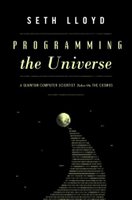 Quantum physicist Seth Lloyd has just published his latest book, Programming the Universe : A Quantum Computer Scientist Takes On the Cosmos. There's a quick interview with him on Wired.
Quantum physicist Seth Lloyd has just published his latest book, Programming the Universe : A Quantum Computer Scientist Takes On the Cosmos. There's a quick interview with him on Wired.From the article:
Computers are our favorite metaphor at the moment, so maybe we see everything as computers. But this view is not that facile. Statistical mechanics, which underlies all chemistry, grew out of the realization that the world is information. The mathematical definition of a bit was first postulated not during the 1930s and '40s when Claude Shannon and Norbert Weiner started information theory but by James Clerk Maxwell and Ludwig Boltzmann during their 19th-century explorations of the nature of the atom. They were working on thermodynamics, but they discovered that the world was made of information.Editorial reviews of Programming the Universe:
From Publishers Weekly
Lloyd, a professor at MIT, works in the vanguard of research in quantum computing: using the quantum mechanical properties of atoms as a computer. He contends that the universe itself is one big quantum computer producing what we see around us, and ourselves, as it runs a cosmic program. According to Lloyd, once we understand the laws of physics completely, we will be able to use small-scale quantum computing to understand the universe completely as well. In his scenario, the universe is processing information. The second law of thermodynamics (disorder increases) is all about information, and Lloyd spends much of the book explaining how quantum processes convey information. The creation of the universe itself involved information processing: random fluctuations in the quantum foam, like a random number generator in a computer program, produced higher-density areas, then matter, stars, galaxies and life. Lloyd's hypothesis bears important implications for the red-hot evolution–versus–intelligent design debate, since he argues that divine intervention isn't necessary to produce complexity and life. Unfortunately, he rushes through what should be the climax of his argument. Nevertheless, Lloyd throws out many fascinating ideas.From Booklist
Lloyd's specialty in physics is the hot topic of quantum information. And his book may do for quantum information what Brian Greene did for strings (The Elegant Universe, 1999) and Stephen Hawking did for spacetime (A Brief History of Time, 1988): popularize a far-out scientific frontier. Will Lloyd's listeners have the same head-scratching reactions as his MIT students do on their first encounter with the idea that information is a quantifiable physical value, as much as mass or motion? Or with the proposition that any physical system--a river, you, the universe--is a quantum mechanical computer? Not if they've read his book, which offers brilliantly clarifying explanations of the "bit," the smallest unit of information; how bits change their state; and how changes-of-state can be registered on atoms via quantum-mechanical qualities such as "spin" and "superposition." Putting readers in the know about quantum computation, Lloyd then informs them that it may well be the answer to physicists' search for a unified theory of everything. Exploring big questions in accessible, comprehensive fashion, Lloyd's work is of vital importance to the general-science audience.Tags: quantum mechanics, book reviews.

No comments:
Post a Comment